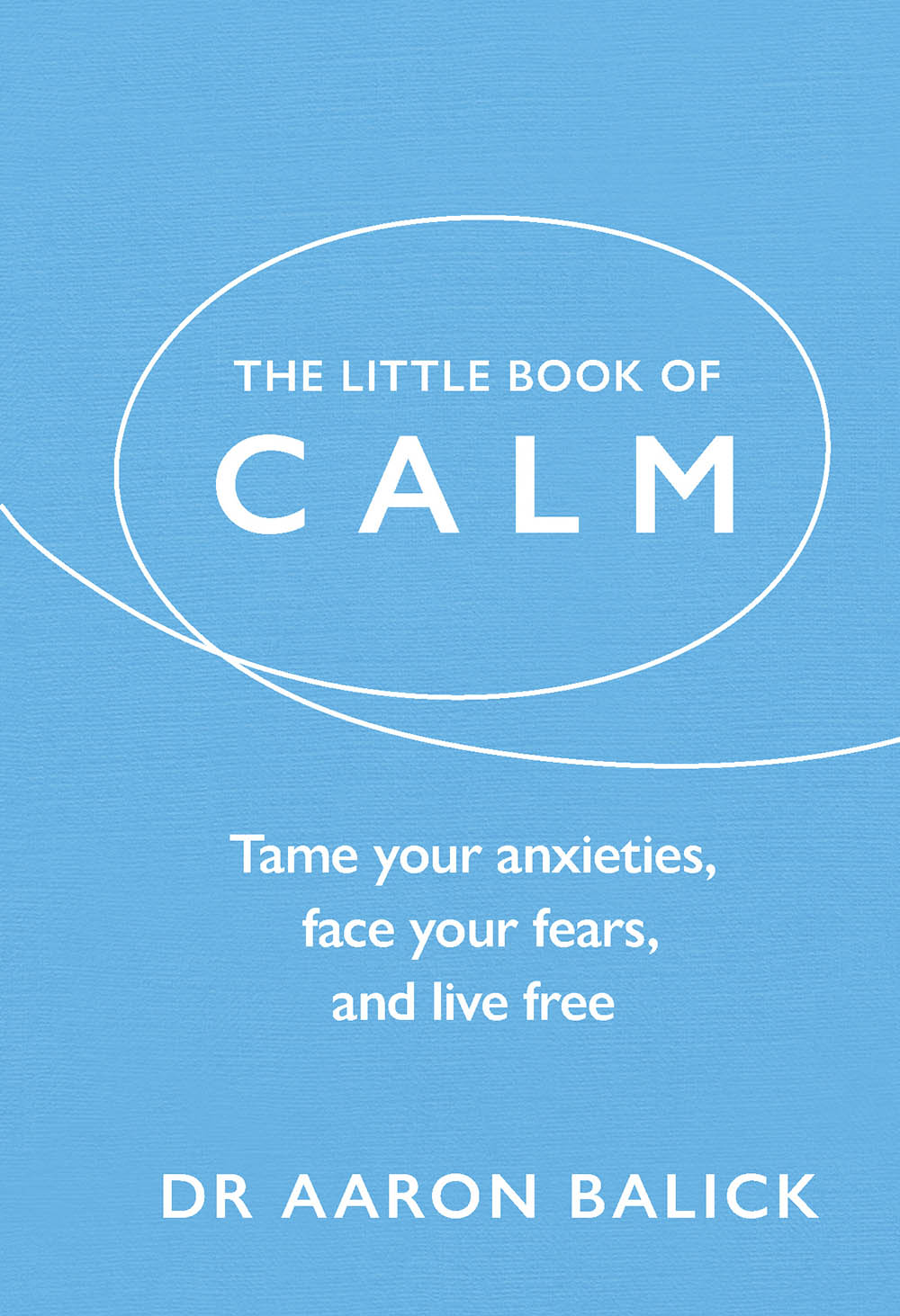‘Keep calm and carry on’ isn’t always as easy as it sounds. Dr Aaron Balick reveals eight easy ways he stays calm himself
Have you ever seen a calm sea during a hurricane? No. The sea naturally reacts to its environment, just like we do. It’s just that when the storm stops, the sea doesn’t go on churning itself up about what happened. The sea lets go.
We may think we need to be calm in the face of life’s challenges, but it’s actually better to feel your emotions and not pretend you’re totally chill when you’re churned up. Real calm doesn’t mean you don’t experience distressing feelings. It means you can have your feelings without letting them twist you into knots.
That’s the theory in a nutshell, but how does it work for me?
When I get that distressing email
First of all I don’t get it when I’m not expecting it so I don’t have to react to anything until I’m good and ready. I have taken the email function off my phone and I only look at emails at regular intervals when I can actually respond to them properly. The days of checking emails on my phone while I’m on the bus, then feeling panicked and unable to do anything about it, are over. Now I only look only when I’m ready.

Don’t let emails control you. You decide when to look, and you decide when to answer. That way, if there is a crisis to deal with, you are ready for it.
During an argument with a partner
First of all, we try to avoid this by having open channels of communication as much as we can – but tensions do arise and most relationships have a flair-up now and then. When this happens, the trick is coming back together afterwards, when things have cooled.
In psychology this is called ‘rupture and repair’. After a conflict where some regrettable things are said, you come together, listen, own up, forgive and get forgiven, and move on. There’s no such thing as a relationship without rupture. It’s how you repair them that counts.
In short, prevent a barney by not saving up your frustrations and keeping open lines of communication. When it does happen, communicate again and repair the rupture.
When I feel angry at work
Fortunately my workplace has a small team and we have good regular communication that prevents flare-ups. Communication is a good preventative strategy. Still, sometimes buttons get pushed, and when buttons are pushed we get reactive. Being reactive is when you fire off an angry email, put down the phone, yell at a colleague, or slam a door.

You can avoid being reactive by listening to your feelings and knowing when we’re getting overloaded –you’re more likely to react when you’re overloaded. When I notice I’m getting full up, I get out of the situation, go for a walk, and come back when I’ve cooled down a bit.
Just like at home, work can be a place of rupture and repair. We can spend more time with people at work than at home, so it’s important to treat those relationships with care.
When I’m feeling overwhelmed by stress or workload
Running a busy psychology hub and therapy practice is a lot of work. Sometimes it can be overwhelming. Recognising I can’t do it all is a start, and while I have high expectations of myself, I try not to pretend I can do it all. Secondly, one of the greatest skills I’ve developed is the art of saying ‘no’. Getting ahead of the game by choosing projects I can actually manage is a good start. When things get overwhelming, it’s time to sort my priorities and make sure I’m working efficiently.
one of the greatest skills I’ve developed is the art of saying ‘no’
I can’t stress how important good systems are. David Allen’s book Getting Things Done really helped me realise how much time I was spending inefficiently – so now that I’ve to systems in place, I’m much less likely to get overwhelmed.
However, even with the best systems overwhelm can happen. So make sure if you’re approaching burnout, get some time away, even if you can only manage an afternoon. You may think you can’t spare the time, but a few hours here and there is a sight better than total burnout.
When negative thoughts about the future arise
I ask myself – what is within and what is outside my zone of control? For the things I do have control over I ask what I can do today to make a difference. Then I’ll do what I can to get started. I’ll do tomorrow what I can do tomorrow, and next year what I can do then, but I can’t get hung up on next year right now.
For those things outside my zone of control, I do my best to accept them, which can be difficult. There’s no point in worrying over what is already set in motion and cannot be changed. Just concentrate on meeting those challenges with equanimity and get help when necessary.
When I’m panicking
I understand that it’s rare that panic serves a useful purpose. In a real emergency, that surge of adrenaline can be helpful, but if that becomes panic, it’ll be wasted – you still need to decide what to do with all that extra energy

If you are in a state of panic because you accidentally emailed the wrong person or didn’t get the answer you were expecting, it’s not doing you much good. In these cases take a step away from your panic. Take a deep breath, then take another. Feel your feet rooted to the ground and tell yourself gently that you’re going to get through this, it’s not the end of the world.
If it happens to be the end of the world, well, then that’s out of your control, and the best thing to do is to accept it rather than panic about it. I must admit that in this case, I’d probably panic too, but who said I was perfect?
If I feel road/commute rage
I tend to cycle to work, which means I probably cause more road rage than experience it! But if I do, I have to ask, ‘what’s the point?’. Red lights are going to be red (and they always turn red just you approach them). People won’t always be kind, and selfish drivers will cut you off. But what can you do? See traffic as a dance. Sometimes someone will step on your toes.

So don’t get rageful, get mindful. Instead of obsessing about getting from A to B, see the commute for what it is – time. Try to enjoy the trip in the moment instead of getting hung up on not being there.
From a practical point of view. Leave early. No point in setting yourself up for stress when you can get ahead of yourself instead.
When complaining on the phone
Whether it’s your local council’s rubbish collection or a damaged furniture delivery, speaking on the phone to get a problem resolved can be infuriating. There’s nothing I can say to make that experience any more desirable than it is, but if it’s going to suck, how can you manage it better?
I manage this through preparation. I make sure I have a book or some small task to complete before picking up the phone and dialling in. This is one of the few times I will multi-task and it helps me feel less powerless. When I’m finally connected, I remember that on the other end of the line is another person – and s/he has been listening to angry people all day long. I’ve learned that starting off the conversation kindly usually makes all the difference. ‘How are you?’ I might say before launching into my complaint.

Nobody likes spending precious life time waiting on hold to complain about a curious charge on a gas bill, but hey, such is life, right? By accepting these things as a part of life rather than some ugly beast that gets in the way, we can just deal with it, without turning into monsters.
Hey, I’m not perfect
Far from it. It just so happens I wrote the book about ‘calm’ so people expect me to have a guru-like capacity for stillness. Well, twenty years of experience as a therapist has taught be a lot, and I’m pretty good at calming others, but following one’s own advice is always a challenge. I get mad about the big things (the state of the world, the environment, politics) and I can get furious about the little things (jammed printers are a particular pet peeve) too.
But I won’t lie – these days I do pretty well preparing so I don’t get overloaded, and when I do, I recognise it relatively quickly and come down much faster than I used to. We cannot expect to be buddhas, but we can learn to prevent ourselves from losing our cool too much. When that fails, try to be mindful, catch yourself when you’re losing it, break the cycle, and clear up the damage shortly after by saying “sorry”. If you can do that, you’re doing pretty well.
The Little Book of Calm by Aaron Balick (Rider Books, £4.99)
Dr Aaron Balick is a clinical psychotherapist with more than 15 years’ experience. He is a media consultant who regularly appears on TV and Radio. Aaron writes regularly for the Huffington Post UK, and has written for Wired, BBC News, Guardian, Telegraph and the Independent. He consults for the BBC on their mental health programming for young people and has been a regular voice for psychology on BBC Radio 1’s The Surgery. He recently appeared in the BAFTA nominated documentary Suicide and Me with Professor Green.
WIN a 4-night spa detox worth £1750
Healthista is giving you the chance to win an incredible spa detox break worth £1750 with spa specialists The Body Retreat at their gorgeous Somerset venue. To enter, just take our 5-minute Gut Health survey
More Healthista content:
De-stress with 30-minutes of calming and toning yoga – week one
7 surprising signs you’re stressed
5 stress symptoms and EXACTLY how to fix them fast
Like this article? Sign up to our newsletter to get more articles like this delivered straight to your inbox.
























































